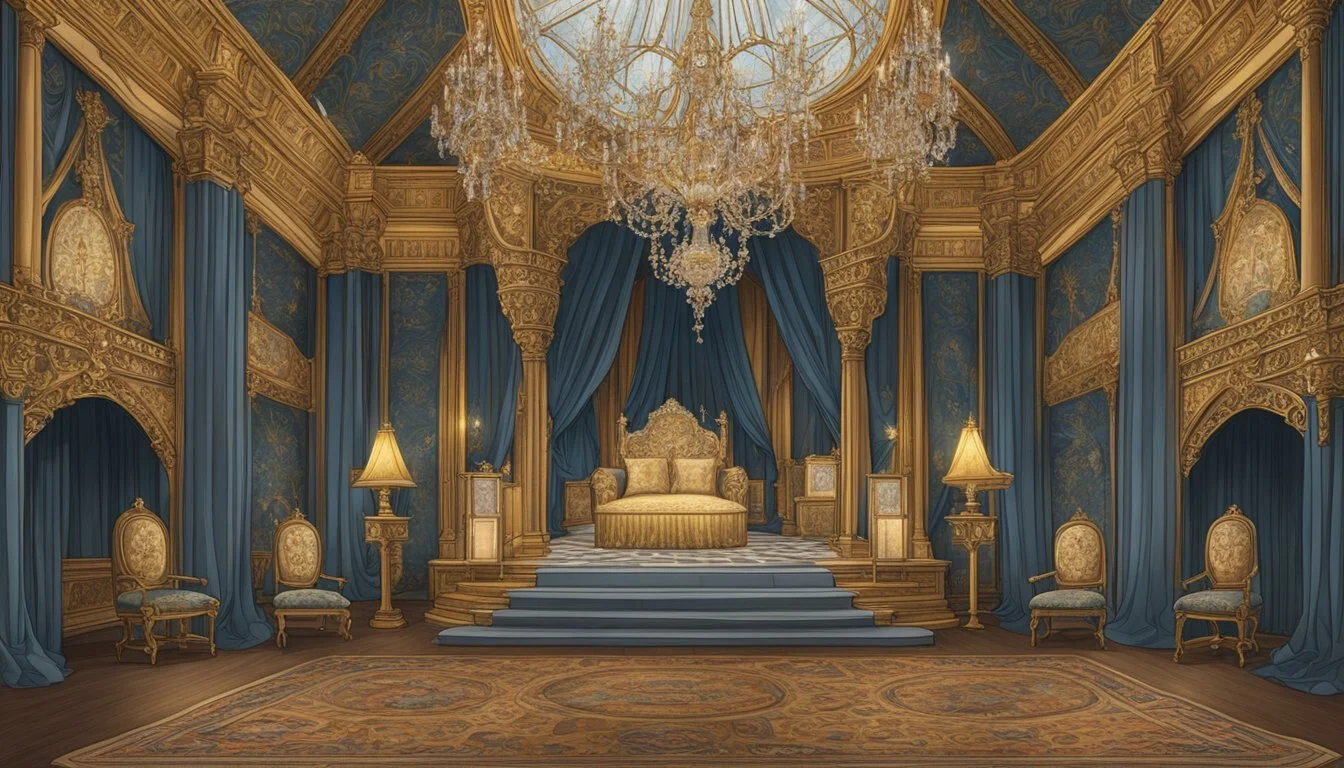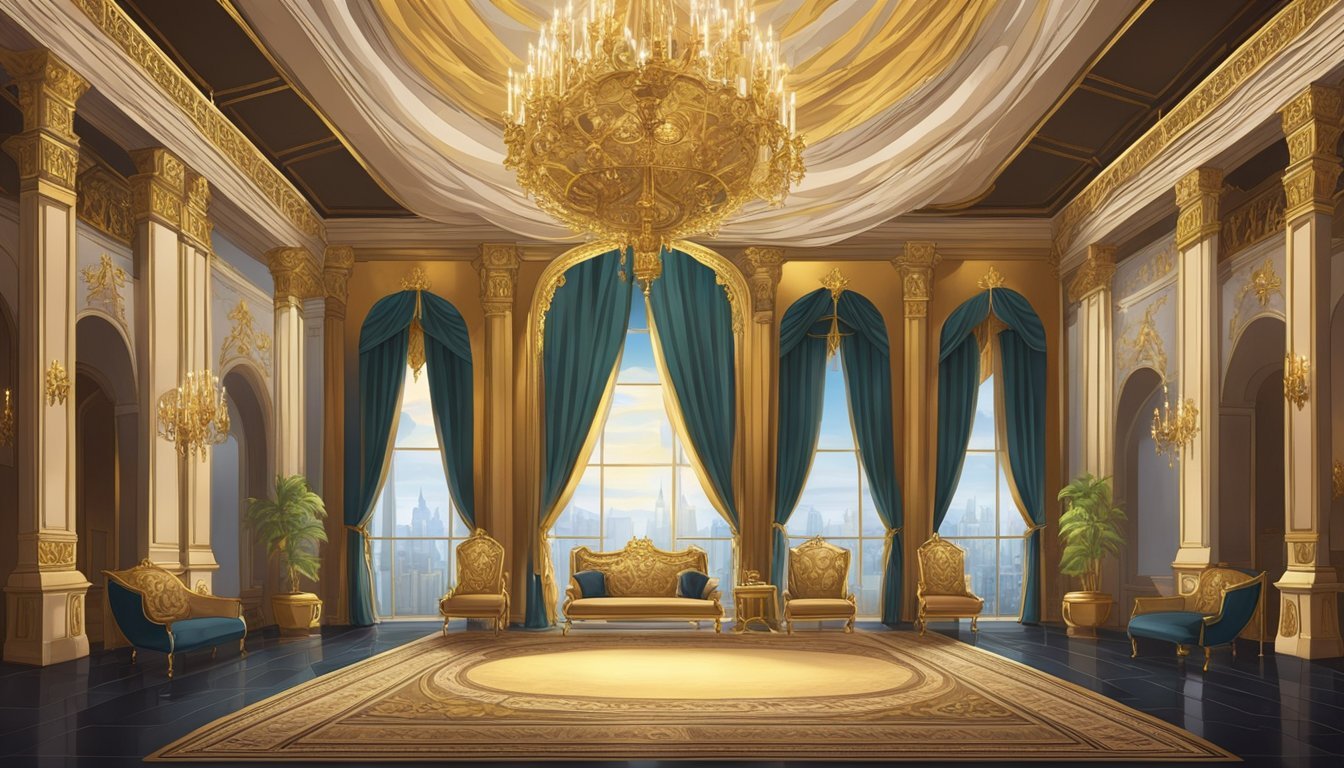6 Films on the Life and Reign of Elizabeth I of England
Cinematic Portrayals of the Virgin Queen
Queen Elizabeth I, one of England's most iconic monarchs, has captivated audiences for centuries. Her life and reign have been dramatized in numerous films, offering viewers glimpses into the Tudor era and the challenges faced by the Virgin Queen.
These cinematic portrayals explore Elizabeth's rise to power, political maneuvering, and personal relationships, bringing history to life on the silver screen. From her early years to her later triumphs, these films showcase different aspects of Elizabeth's character and the pivotal moments that defined her 45-year rule.
1) Elizabeth R (1971)
Elizabeth R is a critically acclaimed BBC television drama series that first aired in 1971. The show consists of six 90-minute episodes chronicling the life and reign of Queen Elizabeth I of England.
Glenda Jackson delivers a powerhouse performance in the title role, portraying Elizabeth from her days as a young princess to her later years as the formidable Virgin Queen. The series covers key events and relationships throughout Elizabeth's 45-year rule.
Elizabeth R offers a deep dive into the political intrigues, personal challenges, and historical significance of Elizabeth's reign. It explores her relationships with advisors, suitors, and rivals, as well as the major events that shaped her era.
The show's production values and attention to historical detail were praised upon its release. Elizabeth R has since become a benchmark for historical dramas about the Tudor period.
The series has been rebroadcast several times over the years, most recently in 2023 on BBC Four. It continues to be regarded as one of the definitive portrayals of Elizabeth I on screen.
2) Young Bess (1953)
Young Bess is a 1953 Technicolor biographical film produced by Metro-Goldwyn-Mayer. The movie focuses on the early life of Elizabeth I, from her tumultuous childhood to the eve of her ascension to the English throne.
Jean Simmons stars as the young Elizabeth, with Stewart Granger portraying Thomas Seymour. Charles Laughton reprises his role as Henry VIII, which he first played two decades earlier in The Private Life of Henry VIII.
The film begins at Hatfield House in 1558, as Elizabeth's half-sister Queen Mary lies on her deathbed. It then traces Elizabeth's journey through her formative years, showcasing the challenges and dangers she faced.
Directed by George Sidney, Young Bess presents a rich tapestry of Tudor England. It depicts Elizabeth's relationships with key figures in her life, including her father Henry VIII and her stepmother Catherine Parr.
The movie captures Elizabeth's transformation from a young princess to the cunning and brilliant monarch she would become. It highlights her intelligence, strength, and determination in the face of adversity.
Young Bess provides viewers with a glimpse into the early experiences that shaped one of England's most iconic rulers. The film's release coincided with the coronation year of Elizabeth II, adding to its cultural significance.
3) Mary, Queen of Scots (1971)
Mary, Queen of Scots, released in 1971, is a historical drama directed by Charles Jarrott. The film stars Vanessa Redgrave as Mary Stuart and Glenda Jackson as Elizabeth I.
Set in the 16th century, the movie explores the complex relationship between the Catholic Mary and her Protestant cousin Elizabeth. It depicts the religious and political conflicts that marked their reigns.
The narrative begins in 1560 with Mary's return to Scotland after the death of her husband, King Francis II of France. It follows her tumultuous rule and eventual downfall.
Hal B. Wallis produced the film, continuing his work on historical dramas. The movie features lavish costumes and set designs, typical of period pieces from this era.
Unlike some adaptations, this version portrays multiple meetings between Mary and Elizabeth. While historically inaccurate, these scenes add dramatic tension to the story.
The film received mixed reviews upon release. Critics praised the performances of Redgrave and Jackson but questioned some historical liberties taken by the screenplay.
4) Elizabeth I (2005)
Elizabeth I (2005) is a two-part television miniseries that offers a compelling portrayal of the later years of Queen Elizabeth I's reign. Directed by Tom Hooper, this historical drama stars Helen Mirren in the titular role.
The series focuses on the final 24 years of Elizabeth's nearly 45-year rule. It explores her political challenges and complex relationships, particularly with the Earl of Leicester, played by Jeremy Irons.
Set against the backdrop of 16th-century England, the production showcases the intricate world of Elizabethan court politics. The narrative delves into Elizabeth's personal struggles and the difficult decisions she faced as a monarch.
Helen Mirren's performance as the aging queen garnered critical acclaim. Her portrayal captures Elizabeth's strength, vulnerability, and the toll of leadership on her personal life.
The miniseries provides viewers with insight into significant events of Elizabeth's reign. It highlights her navigation of religious tensions, political intrigues, and foreign threats to England's security.
Elizabeth I (2005) stands out for its attention to historical detail and nuanced character development. It offers a rich exploration of one of England's most iconic rulers during a pivotal period of her reign.
5) The Virgin Queen (2005)
The Virgin Queen is a BBC miniseries that portrays the life and reign of Queen Elizabeth I of England. This four-part drama stars Anne-Marie Duff as the iconic monarch, offering a comprehensive look at her rule from teenage princess to accomplished queen.
The series explores Elizabeth's personal struggles and political challenges throughout her reign. It delves into her complex relationships, including her connection with Robert Dudley, played by Tom Hardy.
Set against the backdrop of some of Britain's most beautiful houses and landscapes, The Virgin Queen provides a visually stunning portrayal of Elizabethan England. The production team's attention to historical detail adds authenticity to the narrative.
Anne-Marie Duff's performance as Elizabeth I has been praised for its believability and depth. The series covers significant events and decisions that shaped Elizabeth's reign and England's future.
The Virgin Queen was well-received for its historical accuracy and compelling storytelling. It earned a BAFTA TV Award nomination for Best Drama Serial in 2007, cementing its place among notable portrayals of Elizabeth I on screen.
6) Elizabeth: The Golden Age (2007)
"Elizabeth: The Golden Age" is a historical drama film directed by Shekhar Kapur. It serves as a sequel to the 1998 film "Elizabeth" and stars Cate Blanchett reprising her role as Queen Elizabeth I.
The movie focuses on the later years of Elizabeth's reign, depicting events from 1585 to 1588. It explores the queen's personal struggles and political challenges during this tumultuous period.
A major plot point revolves around the threat of invasion by the Spanish Armada. The film portrays Elizabeth's efforts to defend England against King Philip II of Spain's attempt to restore Catholicism to the country.
The story also delves into Elizabeth's relationship with Sir Walter Raleigh, played by Clive Owen. Their complex dynamic adds a personal dimension to the historical narrative.
Geoffrey Rush returns as Sir Francis Walsingham, Elizabeth's spymaster. His character plays a crucial role in uncovering plots against the queen and safeguarding her reign.
The film received praise for its lavish costumes and set designs, which vividly bring the Elizabethan era to life. Blanchett's performance as the aging monarch garnered particular acclaim, earning her an Academy Award nomination.
The Historical Context of Elizabeth I
Elizabeth I ascended to the English throne in 1558, following the tumultuous reigns of her half-siblings Edward VI and Mary I. She inherited a nation divided by religious strife and economic challenges.
The Tudor dynasty, established by her grandfather Henry VII, had brought relative stability to England after the Wars of the Roses. However, her father Henry VIII's break with the Catholic Church created ongoing religious tensions.
Elizabeth faced threats from both Catholic and Protestant factions. She navigated these conflicts by establishing a moderate Protestant church and pursuing a "middle way" in religious matters.
Internationally, England contended with rival powers Spain and France. Elizabeth's reign saw the defeat of the Spanish Armada in 1588, marking a pivotal moment in England's rise as a naval power.
The Elizabethan era witnessed a cultural renaissance in literature, theater, and the arts. William Shakespeare, Christopher Marlowe, and other luminaries flourished during this period.
Elizabeth never married, earning the moniker "The Virgin Queen." Her decision to remain single allowed her to maintain control over the throne and avoid foreign entanglements through marriage alliances.
Key events of Elizabeth's reign:
1559: Act of Supremacy
1585: War with Spain begins
1587: Execution of Mary, Queen of Scots
1588: Defeat of the Spanish Armada
1601: Essex Rebellion
Cultural Influence and Legacy
Elizabeth I's reign left an indelible mark on English culture and society that continues to resonate today. Her era saw a flourishing of the arts and literature that shaped the nation's identity for centuries to come.
Impact on Literature and Arts
Elizabeth I's reign sparked a golden age of English literature and theater. William Shakespeare, Christopher Marlowe, and Ben Jonson produced masterpieces during this period. The queen herself was a patron of the arts, encouraging creativity and expression.
Portraiture flourished, with artists like Nicholas Hilliard creating iconic images of the monarch. These paintings helped craft Elizabeth's public image as the "Virgin Queen" and "Gloriana."
Music also thrived under Elizabeth's rule. Composers like William Byrd and Thomas Tallis created works that are still performed today.
Elizabethan Era and Its Representation
The Elizabethan era is often depicted as a time of great prosperity and cultural achievement in films and literature. Works like "Shakespeare in Love" and "Elizabeth" (1998) portray the period's vibrancy and intrigue.
Fashion from Elizabeth's time, including elaborate ruffs and ornate gowns, continues to influence costume design in historical dramas. The architecture of the period, with its grand manor houses and theaters like the Globe, is frequently recreated on screen.
Elizabeth herself remains a popular subject for filmmakers and writers, who explore her complex personality and political savvy. Her legacy as a strong female ruler in a patriarchal society continues to captivate modern audiences.
The Cinematic Portrayal of Elizabeth I
Elizabeth I has captivated filmmakers for over a century, inspiring numerous portrayals on screen. These films often blend historical facts with creative interpretations, exploring themes of power, gender, and political intrigue in Tudor England.
Accuracy and Creative Interpretations
Early depictions of Elizabeth I appeared in silent films, with Sarah Bernhardt starring in a 1912 production. As cinema evolved, so did portrayals of the Virgin Queen. Cate Blanchett's performances in "Elizabeth" (1998) and "Elizabeth: The Golden Age" (2007) offered a nuanced view of the monarch's reign. These films balanced historical events with dramatic flair.
Flora Robson's portrayal in "Fire Over England" (1937) presented Elizabeth as both a strong ruler and a vulnerable woman. This duality became a common thread in later cinematic interpretations. Some productions, like the 2005 miniseries "Elizabeth I," delved deeper into her personal relationships and private life.
Themes in Elizabeth I Films
Films about Elizabeth I often explore her struggle to maintain power in a male-dominated world. Her decision to remain unmarried and childless is frequently highlighted, portraying her as the "Virgin Queen" who sacrificed personal happiness for her country.
Many productions focus on key historical events:
The Spanish Armada
Execution of Mary, Queen of Scots
Relationships with favorites like Robert Dudley and Robert Devereux
Elizabeth's wit, temper, and political acumen are recurring character traits in these films. Some, like "Mary Queen of Scots" (2019), use Elizabeth's story to examine broader themes of female rulership and rivalry in the 16th century.



